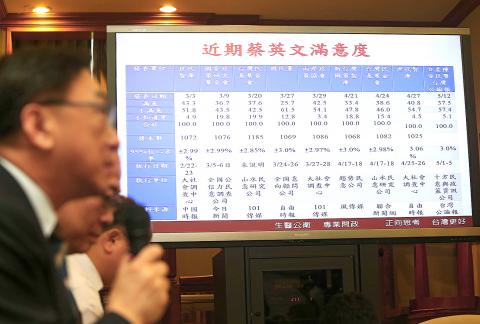The Chinese Nationalist Party (KMT) caucus yesterday again obstructed the legislative general assembly meeting to protest against the government’s Forward-looking Infrastructure Development Program bill and also released poll results saying that 43.3 percent of respondents view the plan as “unhelpful.”
The general assembly meeting yesterday stalled after the Democratic Progressive Party (DPP) and KMT caucuses blocked each other’s proposals to send the review back to committee.
The KMT caucus slowed down the meeting by repeatedly asking for floor votes, but when the DPP caucus did not oppose the return of a DPP lawmaker’s motion to the Procedure Committee for next week’s agenda-setting — a move proposed by the KMT caucus — KMT lawmakers in the main chamber voiced dissent to its own caucus’ proposal to return the motion.

Photo: CNA
The aim was apparently to slow down proceedings by conducting as many votes as possible.
Deputy Legislative Speaker Tsai Chi-chang (蔡其昌), who presided over the meeting yesterday and had on Friday last week already complained about the stalling tactics, asked the KMT caucus to “first discuss among [themselves]” before making such moves as they look “awfully bad.”
Amid the back-and-forth between Tsai and KMT lawmakers, KMT Legislator Alicia Wang (王育敏) said that the KMT is a “democratic and diverse” party in an attempt to explain why some KMT lawmakers disagreed with its caucus’ decision.
Tsai then called for an early noon break for the KMT caucus to “sort things out,” but the meeting never resumed.
Separately yesterday, KMT Legislator Arthur Chen (陳宜民), with the pro-KMT Taiwan People Power News, published the results of a poll conducted by All Dimensions Public Research Inc.
Of those polled, 41.2 percent believe that the plan is helpful, while 43.3 percent disagreed.
People from the region comprised of Yunlin, Chiayi and Tainan were the most supportive of the plan, with 55.7 percent considering it helpful, while people from central Taiwan (Taichung, Changhua and Nantou) had the most doubts, with 48.8 percent saying it is not helpful.
The poll also reported high disapproval ratings of President Tsai Ing-wen (蔡英文) and Premier Lin Chuan (林全).
Tsai’s disapproval rating was 55.6 percent and approval rating was 40.4 percent, while Lin’s disapproval rating was 60.7 percent and only 32 percent of respondents approved of his performance.
DPP lawmakers from central Taiwan also held a news conference yesterday calling on KMT lawmakers from the region not to block the infrastructure plan.
Legislator Chang Liao Wan-chien (張廖萬堅) from Taichung, presenting a petition initiated by Taichung Mayor Lin Chia-lung (林佳龍) asking for support for local infrastructure construction, said that KMT legislators based in the city — including Johnny Chiang (江啟臣), Yen Kuan-heng (顏寬恆) and Lu Yen-hsiu (盧燕秀) — have all signed the petition.
Changhua Legislators Hung Tsung-yi (洪宗熠) and Chen Su-yueh (陳素月) also criticized KMT Legislator Wang Hui-mei (王惠美) for blocking the plan in the legislature when they supported local development projects during the president’s visit to the county last month.
Additional reporting by Tseng Wei-chen

‘DENIAL DEFENSE’: The US would increase its military presence with uncrewed ships, and submarines, while boosting defense in the Indo-Pacific, a Pete Hegseth memo said The US is reorienting its military strategy to focus primarily on deterring a potential Chinese invasion of Taiwan, a memo signed by US Secretary of Defense Pete Hegseth showed. The memo also called on Taiwan to increase its defense spending. The document, known as the “Interim National Defense Strategic Guidance,” was distributed this month and detailed the national defense plans of US President Donald Trump’s administration, an article in the Washington Post said on Saturday. It outlines how the US can prepare for a potential war with China and defend itself from threats in the “near abroad,” including Greenland and the Panama

A wild live dugong was found in Taiwan for the first time in 88 years, after it was accidentally caught by a fisher’s net on Tuesday in Yilan County’s Fenniaolin (粉鳥林). This is the first sighting of the species in Taiwan since 1937, having already been considered “extinct” in the country and considered as “vulnerable” by the International Union for Conservation of Nature. A fisher surnamed Chen (陳) went to Fenniaolin to collect the fish in his netting, but instead caught a 3m long, 500kg dugong. The fisher released the animal back into the wild, not realizing it was an endangered species at

The High Prosecutors’ Office yesterday withdrew an appeal against the acquittal of a former bank manager 22 years after his death, marking Taiwan’s first instance of prosecutors rendering posthumous justice to a wrongfully convicted defendant. Chu Ching-en (諸慶恩) — formerly a manager at the Taipei branch of BNP Paribas — was in 1999 accused by Weng Mao-chung (翁茂鍾), then-president of Chia Her Industrial Co, of forging a request for a fixed deposit of US$10 million by I-Hwa Industrial Co, a subsidiary of Chia Her, which was used as collateral. Chu was ruled not guilty in the first trial, but was found guilty

DEADLOCK: As the commission is unable to forum a quorum to review license renewal applications, the channel operators are not at fault and can air past their license date The National Communications Commission (NCC) yesterday said that the Public Television Service (PTS) and 36 other television and radio broadcasters could continue airing, despite the commission’s inability to meet a quorum to review their license renewal applications. The licenses of PTS and the other channels are set to expire between this month and June. The National Communications Commission Organization Act (國家通訊傳播委員會組織法) stipulates that the commission must meet the mandated quorum of four to hold a valid meeting. The seven-member commission currently has only three commissioners. “We have informed the channel operators of the progress we have made in reviewing their license renewal applications, and